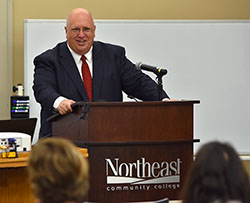NORFOLK, NE – Approximately twenty individuals have expressed a serious interest in using their language skills to assist others through Nebraska’s judicial branch. They were approximately 40 people to attend an information session recently at Northeast Community College in Norfolk and at its extended campus in South Sioux City to learn more about a certified court interpreter preparation and certification program, sponsored through a partnership between the College and the Nebraska Supreme Court.
Court interpreters are individuals who possess an educated, native-like mastery of both English and a second language, display a wide general knowledge, and perform the three major types of court interpreting: sight translation, consecutive interpreting, and simultaneous interpreting.
Supreme Court Justice William Cassel said it is important, to the cause of justice, that languages are accurately and precisely interpreted in the court system.
“The role of an interpreter in the court system is not to approximate what is being said, it is to translate or interpret precisely what is said and that it is important that is done at the highest levels of skill. Because if it’s not done in that fashion, then our goal of ascertaining the truth and seeing that justice is accomplished cannot … be done without that level of skill.”
In fiscal year 2019, the State of Nebraska funded 11,148 interpreter appearances, providing language access for 23,127 contacts within the Judicial Branch. Interpreters served speakers of 49 different languages and dialects in Nebraska courts and probation offices. The majority of interpreter services provided were Spanish, but the need for a variety of languages including Arabic, Somali and Karen is steadily increasing.
Jennifer Verhein, administrator of the Supreme Court’s Office of the Courts and Probation, said county and district courts across Nebraska are in desperate needs of interpreters. She encourages those with the skills of language interpretation to “tap into access to justice to give people a voice in courts across Nebraska.”
Northeast’s Adult Education Department is coordinating the program at the College. Julie Clark, adult education coordinator, said Northeast will provide a test preparation course that will help participants familiarize themselves with criminal procedures, high register English grammar skills and court room verbiage.
“One of the wonderful things about adult education is that we are grant funded. This means that we aren’t actually allowed to charge you,” Clark told meeting attendees. “I believe with my whole being that this is a program that channels the wonderful intellectual skill of knowing multiple languages with a meaningful economic outcome while also serving the needs of the many individuals who are finding their way through the justice system.”
One place that understands the importance of interpreters is the Tyson Foods processing plant in Dakota City, where over two dozen languages are spoken.
“So, tonight, as you consider signing-up to be trained and become a certified court interpreter, I encourage you to take to heart the noble responsibility of being an impartial cultural responsiveness mediator,” said Alain Ndagijimana, who serves as chaplain at the Tyson facility. “Understand, the need for you to have a solid cultural background in both cultures (your own and the U.S. culture), and the expectation from you to give a full cultural understanding where there is no shared knowledge. “
There are three steps to interpreter certification through Northeast Community College. It begins with an intensive two-day workshop that introduces modes of interpretation and interpreter ethics. The Interpreter Written Examination Preparation Course will be held in October and November, followed by the Interpreter Oral Examination Preparation Course from late November through February. Oral exams will be held in late February followed by a graduation ceremony and then a swearing in ceremony in April.
Certified and registered court interpreters are to complete 10 credit hours of approved continuing education during each two-year reporting period. In addition, at least four hours must be earned at an approved ethics and skills building workshop.
John Blaylock, executive vice president at Northeast, said the program is another example of how Northeast works with businesses, organizations and agencies to solve workforce needs in the region.
“This collaboration demonstrates how bringing people together and creating opportunities for those of you who have bilingual abilities can solve our court system’s workforce needs and also create economic opportunities for individuals with bilingual skills,” he said.
Cassel, who is originally from Johnstown, is pleased that Northeast Community College is involved in the training.
“(Northeast) is a national leader in this area and the association that we have with the Nebraska Supreme Court and Northeast Community College is a vital and important one. I’m here to emphasize the importance of that relationship and to emphasize to those of you that are considering doing this or are involved in this program already … to be a diligent and valuable addition to our Nebraska judicial system.”
For more information on the certified court interpreter preparation and certification program, contact Clark at (402) 844-7254 or at jclark15@northeast.edu.
--###--
PHOTO CUTLINE
Nebraska Supreme Court Justice William Cassel speaks during a court interpreter information session at Northeast Community College recently. The College is partnering with the Supreme Court to offer a program to train more interpreters to assistant individuals through Nebraska’s judicial system.

